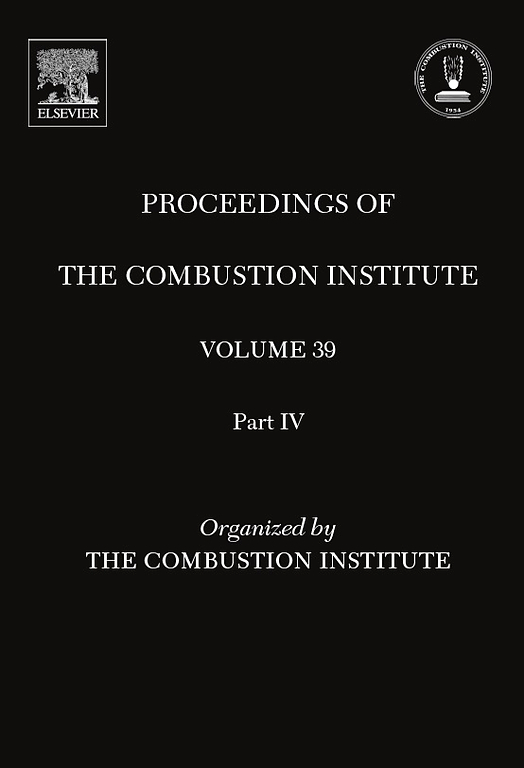Effects of cryogenic temperature on turbulent premixed hydrogen/air flames
IF 5.3
2区 工程技术
Q2 ENERGY & FUELS
引用次数: 0
Abstract
As a carbon-free fuel, hydrogen (H) is of increasing importance in the development of low-emission engines. Due to a low volumetric energy density, H is preferably stored at cryogenic temperatures ( K). In this context, it is indispensable to investigate the combustion behavior of hydrogen at such low temperatures. Although some studies focused on the ignition and detonation of hydrogen, investigations about premixed H/air flame propagation interacting with turbulence at cryogenic temperatures are rather scarce. In this work, stoichiometric turbulent premixed /air flames are studied at cryogenic temperature () and normal temperature (), using three-dimensional direct numerical simulations with detailed chemistry and transport. It is found that at cryogenic temperature, dimensionless turbulent flame speed and flame surface area increase significantly due to Darrieus–Landau instability (DLI) induced by a large expansion ratio. Since the effective Lewis numbers of the two cases are close to unity, the diffusive-thermal instability (DTI) is negligible in the cases. Furthermore, it is found that there are substantial differences in the peaks of and mass fractions between the two cases, probably due to smaller local flame curvatures at cryogenic temperature. Moreover, the results indicate that the flame response to stretch is not sensitive to the change of the initial temperature. A larger fractal inner cutoff scale is found at K, suggesting that the flame exhibits more large-scale flame wrinkling than that at K due to the impact of DLI. All these facts lead to the conclusion that cryogenic temperature can significantly promote large-scale flame wrinkling, increase turbulent flame speed and flame surface area, and affect intermediate species distribution. This suggests that combustion of cryogenic H may have a high risk of flashback.低温对湍流预混合氢气/空气火焰的影响
作为一种无碳燃料,氢气(H)在低排放发动机的开发中越来越重要。由于氢的体积能量密度较低,因此最好在低温(K)下储存。在这种情况下,研究氢气在这种低温下的燃烧行为是必不可少的。虽然一些研究侧重于氢气的点燃和爆燃,但有关低温下氢气/空气预混合火焰传播与湍流相互作用的研究却非常少。在这项工作中,利用三维直接数值模拟,结合详细的化学和传输,研究了低温()和常温()下的化学湍流预混氢气/空气火焰。研究发现,在低温条件下,由于大膨胀比引起的达里厄斯-朗道不稳定性(DLI),无量纲湍流火焰速度和火焰表面积显著增加。由于两种情况下的有效路易斯数都接近于统一,因此扩散-热不稳定性(DTI)在这两种情况下都可以忽略不计。此外,研究还发现,两种情况下火焰的峰值和质量分数存在很大差异,这可能是由于低温下火焰的局部曲率较小。此外,结果表明,火焰对拉伸的响应对初始温度的变化并不敏感。在 K 温度下,分形内截止尺度较大,这表明由于 DLI 的影响,火焰比 K 温度下的火焰表现出更大尺度的火焰皱缩。所有这些事实都表明,低温能显著促进大尺度火焰皱缩,增加湍流火焰速度和火焰表面积,并影响中间物质的分布。这表明,低温 H 的燃烧可能具有很高的回火风险。
本文章由计算机程序翻译,如有差异,请以英文原文为准。
求助全文
约1分钟内获得全文
求助全文
来源期刊

Proceedings of the Combustion Institute
工程技术-工程:化工
CiteScore
7.00
自引率
0.00%
发文量
420
审稿时长
3.0 months
期刊介绍:
The Proceedings of the Combustion Institute contains forefront contributions in fundamentals and applications of combustion science. For more than 50 years, the Combustion Institute has served as the peak international society for dissemination of scientific and technical research in the combustion field. In addition to author submissions, the Proceedings of the Combustion Institute includes the Institute''s prestigious invited strategic and topical reviews that represent indispensable resources for emergent research in the field. All papers are subjected to rigorous peer review.
Research papers and invited topical reviews; Reaction Kinetics; Soot, PAH, and other large molecules; Diagnostics; Laminar Flames; Turbulent Flames; Heterogeneous Combustion; Spray and Droplet Combustion; Detonations, Explosions & Supersonic Combustion; Fire Research; Stationary Combustion Systems; IC Engine and Gas Turbine Combustion; New Technology Concepts
The electronic version of Proceedings of the Combustion Institute contains supplemental material such as reaction mechanisms, illustrating movies, and other data.
 求助内容:
求助内容: 应助结果提醒方式:
应助结果提醒方式:


